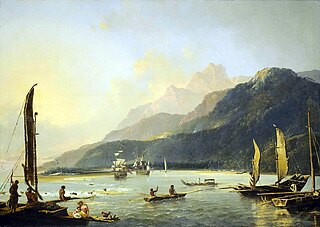
Scarborough was a double-decked, three-masted, ship-rigged, copper-sheathed, barque that participated in the First Fleet, assigned to transport convicts for the European colonisation of Australia in 1788. Also, the British East India company (EIC) chartered Scarborough to take a cargo of tea back to Britain after her two voyages transporting convicts. She spent much of her career as a West Indiaman, trading between London and the West Indies, but did perform a third voyage in 1801–02 to Bengal for the EIC. In January 1805 she repelled a French privateer of superior force in a single-ship action, before foundering in April.

HMS Adventure was a barque that the Royal Navy purchased in 1771. She had been the merchant vessel Marquis of Rockingham, launched in 1770 at Whitby. In naval service she sailed with Resolution on James Cook's second expedition to the Pacific in 1772–1775. She was the first ship to circumnavigate the globe from west to east. After her return she served as a store ship until 1779. The navy sold her in 1783 and she resumed a civilian career, but retaining the name Adventure. She was lost in May 1811.
Britannia may refer to any one of a large number of ships:
HMS Leith, also known as HM hired armed ship Leith, was launched in 1744 or 1746 in the British "Plantations", more specifically, the colony of Maryland. From 1764 to 1777 she was a Greenlandman, that is a whaler, in the waters east of Greenland. Between 1777 and 1782 she served the Royal Navy as a transport and hired armed naval ship. She was last listed in 1783.
Rolla may refer to a number of sailing ships;
Coromandel was the French prize Modeste, captured in 1793 and refitted at Chittagong, British India. She made two voyages transporting convicts to Port Jackson, the first for the British East India Company (EIC). A French privateer captured her in 1805, but she had returned to British hands before 1809. An American privateer captured her in 1814, but this time the British Royal Navy recaptured her within days. She foundered in Indian waters on 6 February 1821.
Marquis of Rockingham was a ship launched for the British East India Company in 1771. She made one complete voyage to Bombay. During her second voyage to Bombay she was wrecked in 1777.
A number of ships have been named Friendship:
Numerous ships have sailed under the name Antelope. Notable ones include:
Several vessels have borne the name Rockingham:
Several ships have borne the name Caledonia for Caledonia:
Governor Trumbull was launched at Norwich, Connecticut in 1777 as a purpose-built privateer. There is no record of her having captured any British vessels but she did raid Tobago in 1779. The Royal Navy captured her shortly thereafter and took her into service as HMS Tobago. she served in the Leeward Islands until the Navy sold her in 1783, probably at Jamaica. She was apparently wrecked on 16 August 1787 at Tobago.
Paragon was launched at Whitby in 1800. Between 1803 and 1805 she served as an armed defense ship protecting Britain's coasts and convoys. She then served as a transport on the 1805 naval expedition to capture the Cape of Good Hope. Next, she returned to mercantile service and in 1814 a French privateer captured her, but the British Royal Navy recaptured her the next day. She sailed to India in 1818 under a license from the British East India Company (EIC), and was wrecked in March 1819 while inbound to Calcutta.
Several ships have been named Hinchinbrooke, or Hinchinbrook, or Hinchinbroke, or Hinchenbrook.
Several vessels have been named Tartar:
Grenville was launched at Deptford in 1764 as an East Indiaman. She made four voyages for the British East India Company (EIC) before her owners sold her in 1777 to the Royal Navy, which renamed her HMS Tortoise and employed her as a transport. She foundered in 1779.
Several vessels have been named Brothers:
Several vessels have been named Lord Stanley.
Several vessels have been named Parnassus, for the mountain Parnassus.
This page is based on this
Wikipedia article Text is available under the
CC BY-SA 4.0 license; additional terms may apply.
Images, videos and audio are available under their respective licenses.

